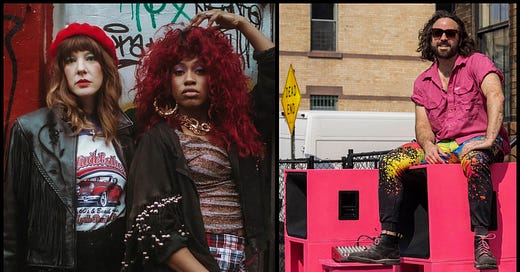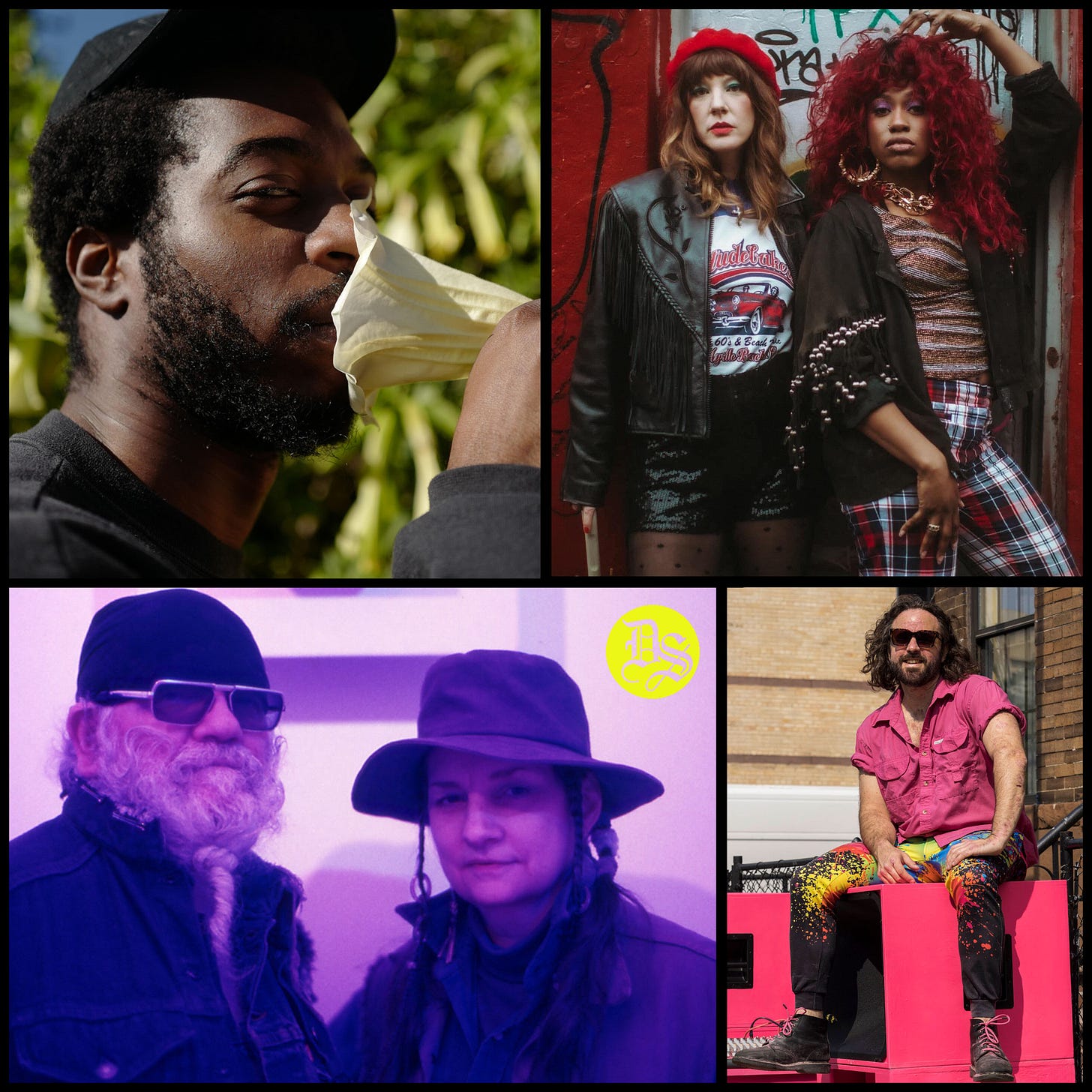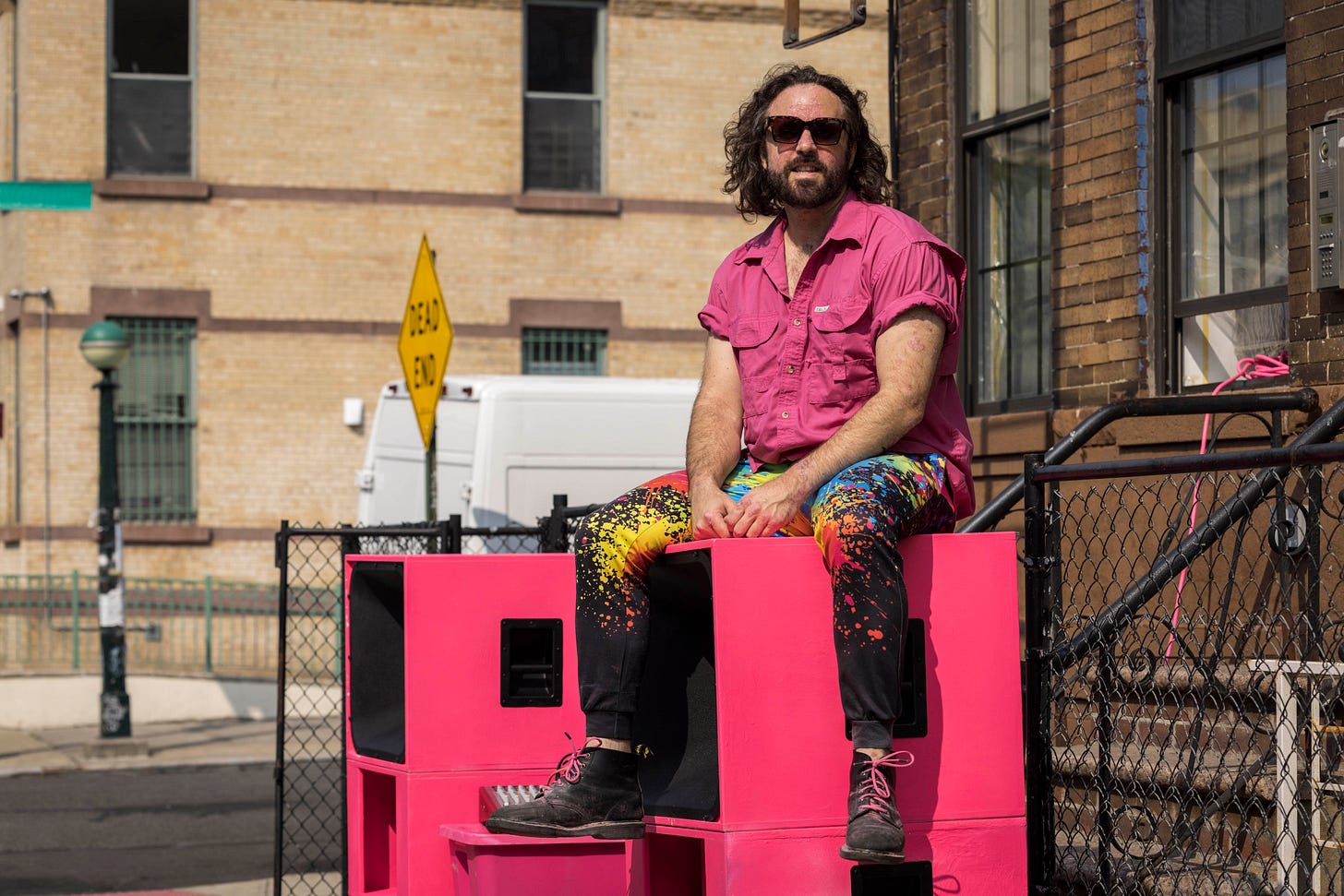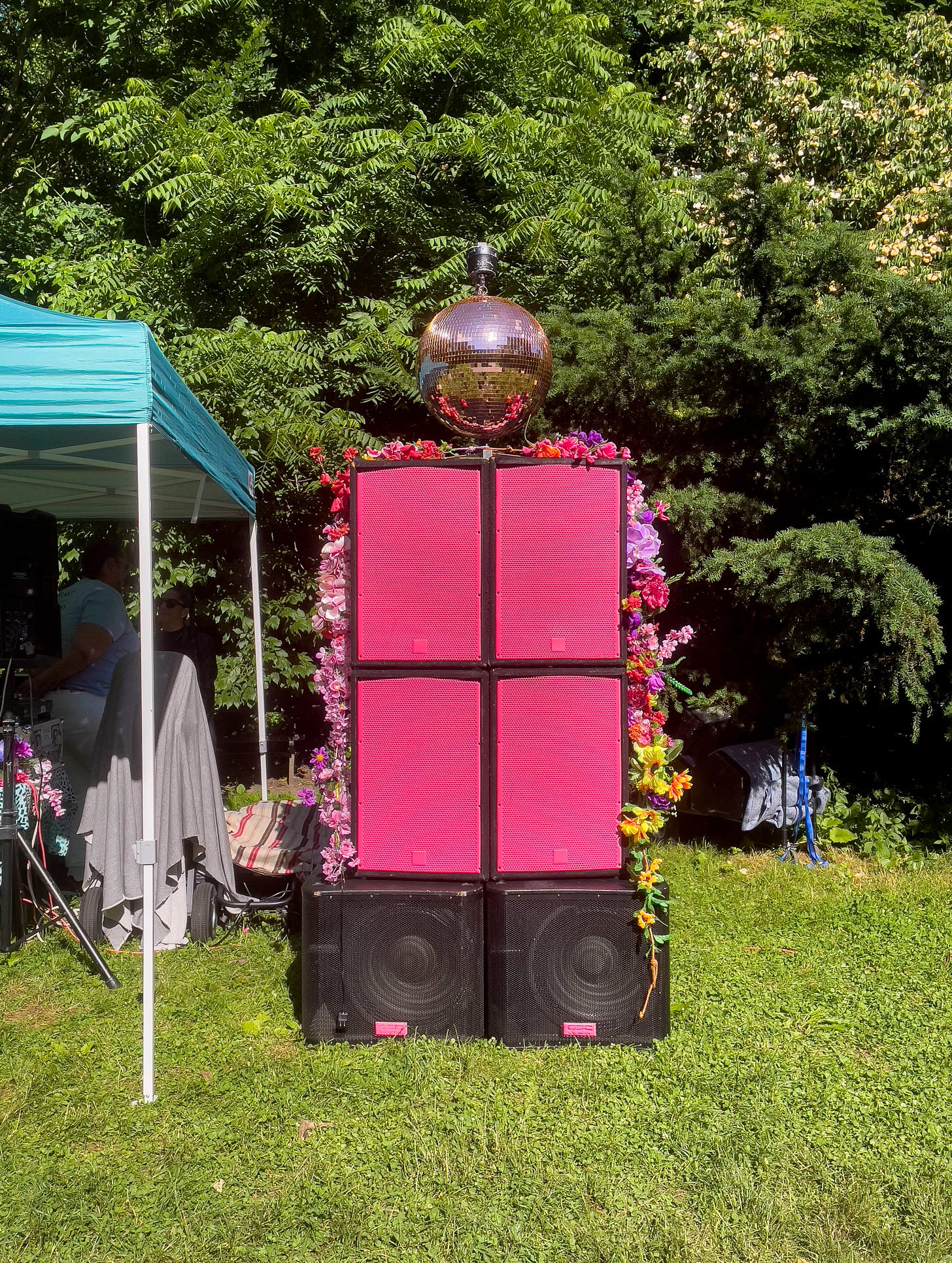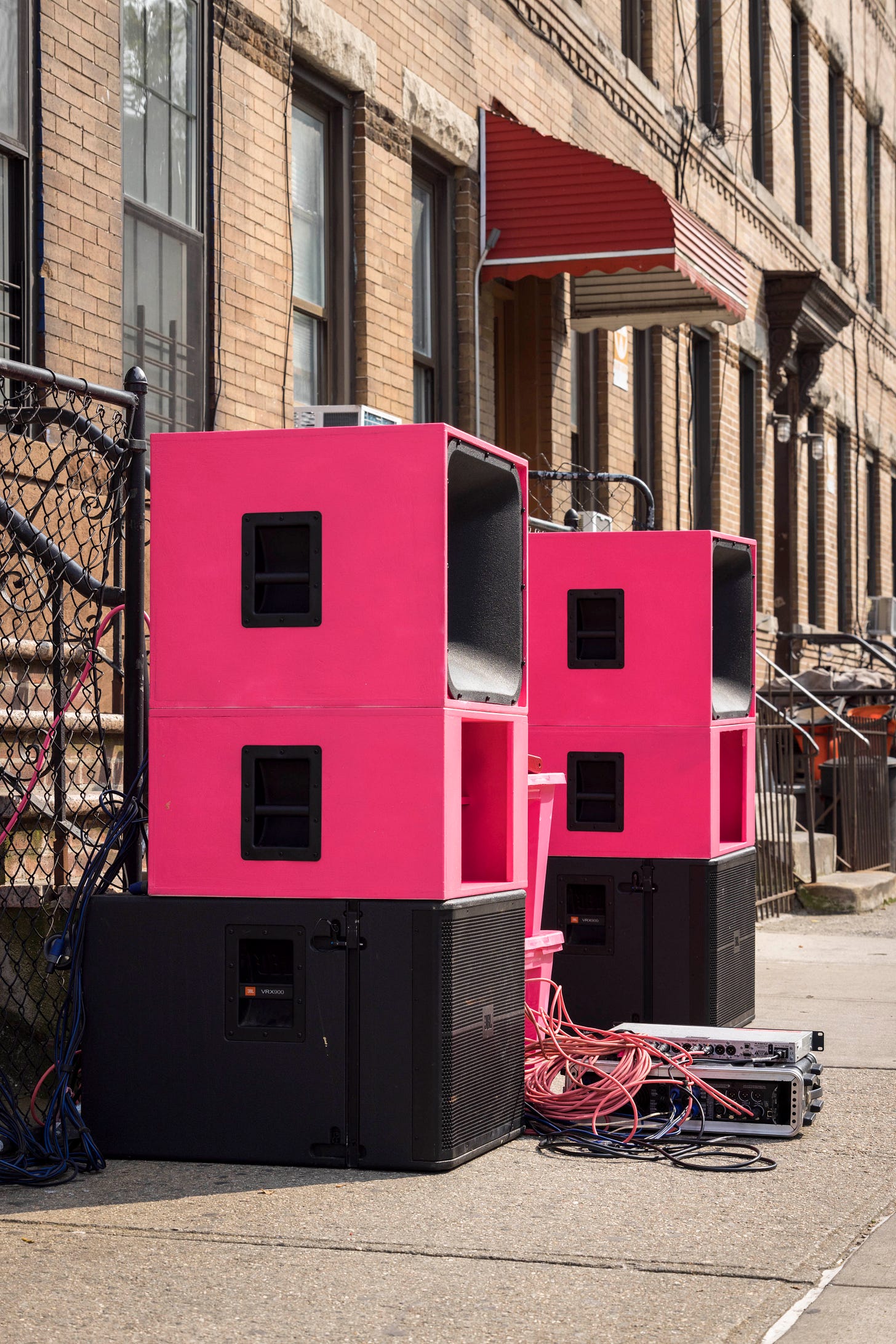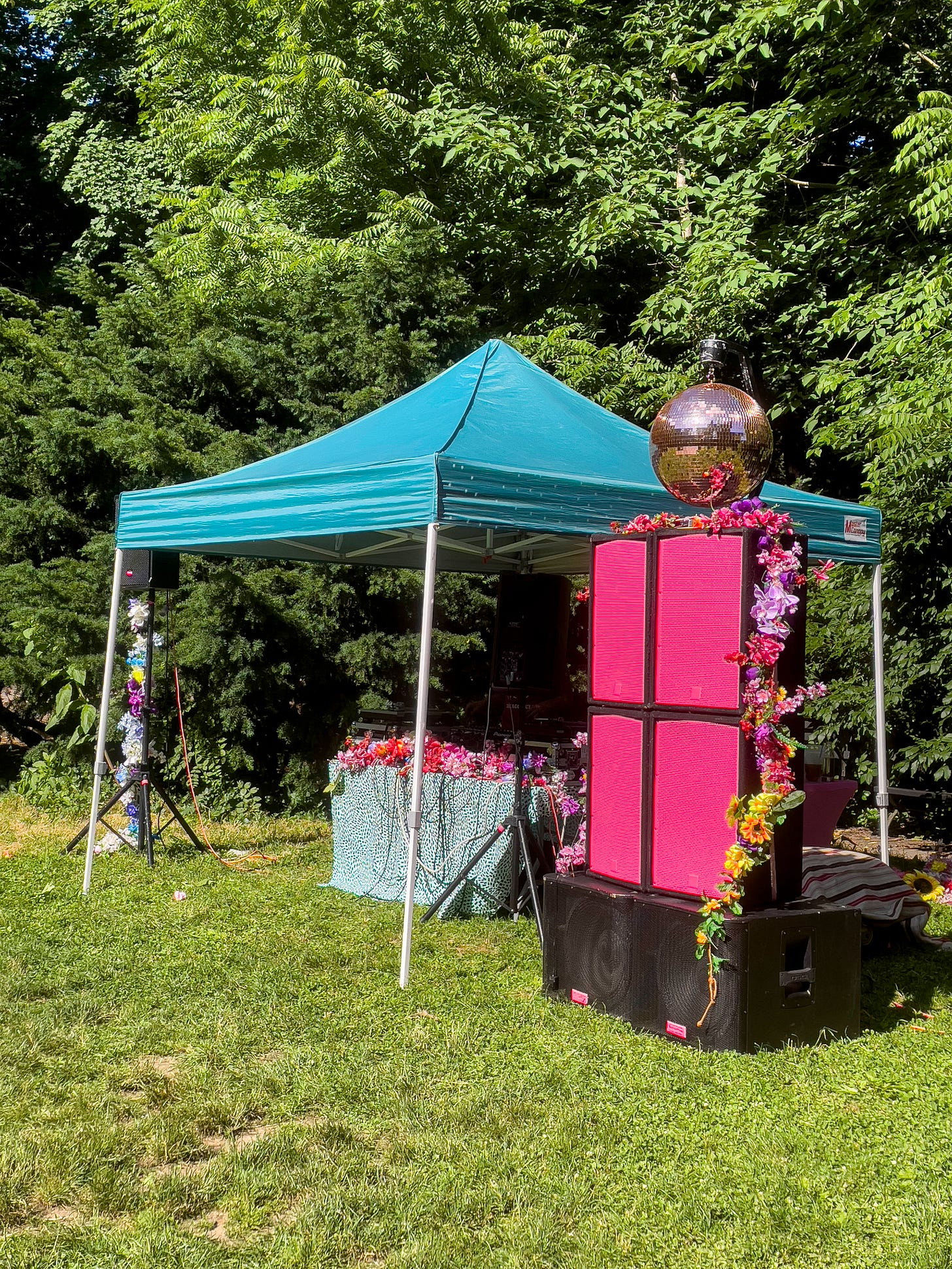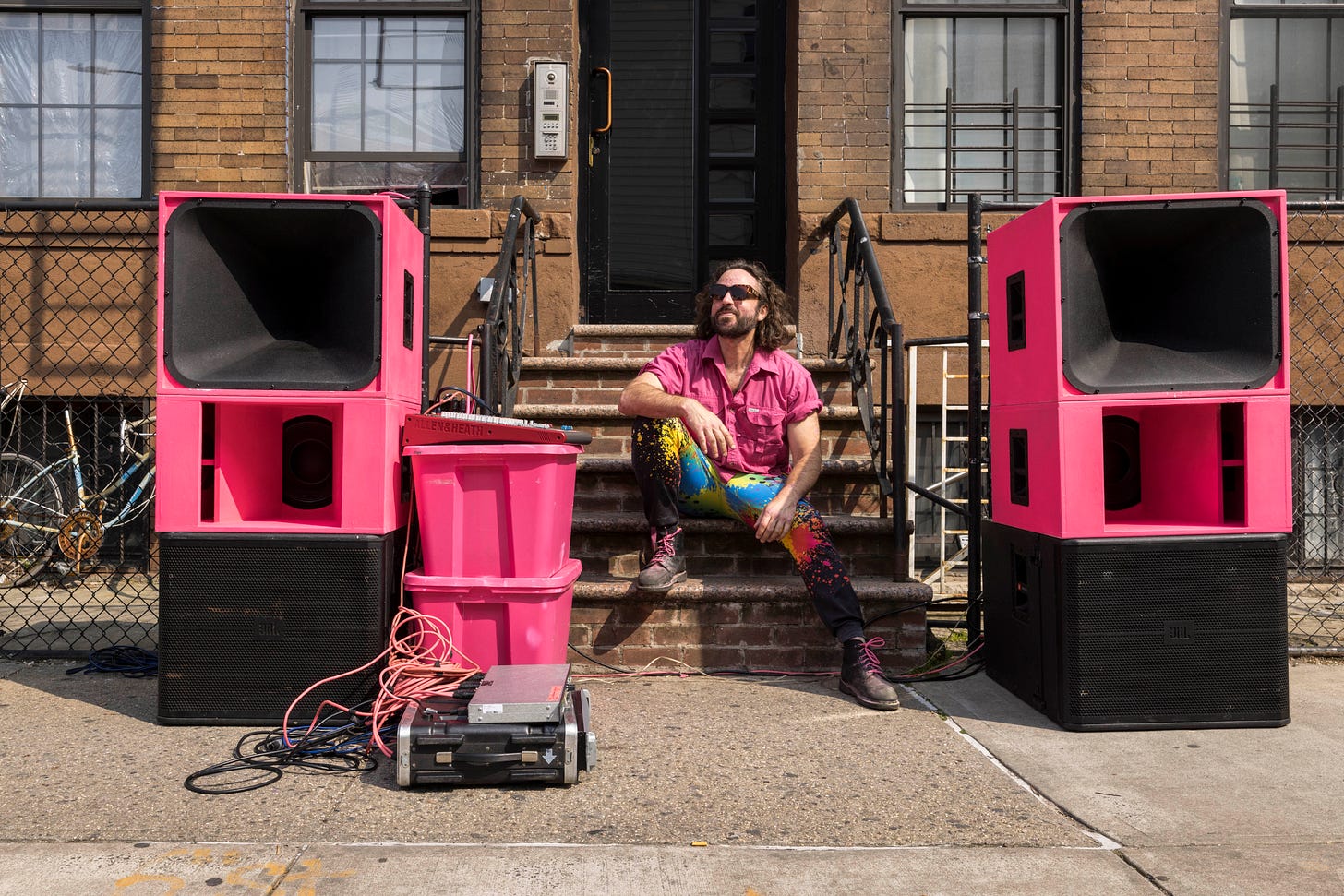Bklyn Sounds 5/31/2023 - 6/5/2023 + Karlala and NYC's Sound System Culture
An interview with Karl Scholz about a current public sound culture in the city + Shows: 79.5 / Pan-Afrikan Peoples Arkestra / La Monte Young & Marian Zazeela / "Disco Tehran" / Dope Jams + Optimo /...
It is very apropos that I met the Karlala Sound System long before I met Karl Scholz, the guy who built it. In the glowing, momentarily utopian part of the vaccine summer of 2021, when dance parties occupied much of the city’s park and closed-street spaces, Karlala already stood out. It was a proper sound system of multiple highs and subs, and it carried power, but did so subtly. It was also gorgeous and easy to remember, painted pink, covered in flowers, and came with its own disco ball. (I bet you saw it too…) And the DJs who gravitated around it — Scholz’s partners in the wonderful Sweet Kicks party, but other Bklyn Sounds regulars as well — treated the system as the treasure it was. Even if by summer of 2022, as the city’s street-sound glow gave way to bureaucratic normalcy, with more public spaces frowning on pop-up dance parties, you could still regularly find Karlala in the parks and the school yards. Moreso, along with Mo Yasin’s system, Karlala heralded an evolution of the city’s sound, especially its public displays.
Which is why in August of 2022 I pitched a story on Karala and the city’s post-lockdown public soundsystem culture (a major inspiration for Bklyn Sounds). Late that month, I sat down with Scholz for an interview for a big media organization, to discuss his system, the feeling in the streets, and the increasing crackdown on sonic gatherings, but to also talk about why he does what he does, especially in the way that he does it. With deep community intentions as a central tenet. Sadly, the big media organization spiked the story. But Karl and I began seeing each other frequently at music events around the city, some of which Karlala was powering. When a couple of weeks before summer began, Karl said he and @nes.ugh were building new speakers to add to Karlala’s summer arsenal, and invited Kate and I to take some pics of the finished stacks, and be on-hand for the sonic test-drive, I thought it would be a great idea to bring back that conversation. After all, Karl Scholz is helping facilitate Bklyn Sounds - exactly the kind of musicker you should be on the lookout for.
(The interview took place on August 23, 2022 and was edited for clarity and length. All photos by Kate Glicksberg)
Let's start with your interest in sound system culture. How did you get involved in being the sound guy for parties?
That started in California, uh, around the age of maybe 11 or 12. I started to get obsessed with dance music, house music, and there was a vibrant scene in the Bay Area that I was slowly becoming aware of. I largely got that initially through college radio and then some of the radio stations would have like party shows on the weekends, I was just completely obsessed and trying to find out everything I could and got into music production. I was able to borrow a sampler from my uncle and we had a PC at the house. And so I had some very basic music production going on and then went to my first rave at the age of 14. My parents dropped me off before the party started and then picked me up the next morning at like 10:00 AM. I just made a deal with them that I wouldn't do any drugs. And I had stuck to that, so they let me go to raves. By the age of 15, I had a small sound system. I was working in a music store which sold musical equipment, so I could get things for the same price that it cost the store. So, I had a small sound system and a mobile DJ business. I went as DJ Don't Do Drugs and my MC was MC Stay In School.
So I had that running, doing break-in parties in the Bay Area. There was a neighborhood that's now called Dog Patch in San Francisco. It had a different name before that got changed, and that was largely empty warehouse spaces. We would do parties there, in abandoned warehouses and on the beaches. This was with other teens, essentially. I think the oldest people in our crew were like 21. And we were cobbling together all the speakers. We would get my system and I remember borrowing a guitar amp from somebody, and we just threw that in the stack, powering it with a generator
And then in 2003 I came to New York and tried to DJ, but found that was difficult. It was a whole different vibe here. Ultimately I did a lot of DJing in New York, but I came in, hit the ground running and got denied basically. <laugh> I was already a house head in the Bay Area. I looked up house music in New York. At that time I got to go to Shelter, Body And Soul, all kinds of events happening around the city. I remember there was one in particular (I still have the t-shirt for it) called House The Vote that had Louie Vega and, I believe, Kevin Hedge. Then I became a regular on Monday nights at Deep Space at Cielo. I did not miss that. I even got myself into an NYU dorm close to there, so I could just easily get there on Monday nights.
I went to NYU, the Gallatin program which is like the school of choose-your-own-adventure. You get the course guide for the whole university and basically get to pick whatever classes you wanna take. So I took a bunch of classes in the music-tech program and I would cite Dafna Naphtali and Luke Dubois…those were the two big ones that really influenced me at that time.
Influenced you how?
I would say that the raving experience and dance music was my guiding light. I was interested in every aspect of that — music production, DJing, sound systems, as a means of actually performing the dance ritual. At that time, they were showing me that you could make your own musical instruments. Cause I didn't really have the money to buy a room full of synthesizers, but I could make my own samplers and musical instruments. Which ended up being my day job and career.
So what is your day job and career?
I'm a music software developer. At the moment I make embedded musical engines. Basically, drum machines that are hidden inside an app to make sound for new age meditation, soundbaths, those types of apps. I made an app on my own, Werkbench, put it out independently in 2011, that was a drum machine sampler, very dance music-focused. It was one of the early iPad music apps. before any of the major companies had really gotten into that space. That didn't quite do well enough for me to survive off of, but when I went seeking out other work after that, I made a vow to myself that the money that was trickling in from that app, I would put back towards dance music. And that's how I initially funded the sound system.
Tell me a little bit about the history of the Karlala sound system.
So I've mentioned that I had a mobile DJ business as a teen and then in New York I worked in live sound and I worked sound for DIY spaces. Rubulad was the big one. I was taking care of their sound system. At the time they were in a building that had four large performance rooms. One would be for rock bands. One had a small stage for one-person acts, either musicians or puppet shows, leftfield stuff. And then two dance-floor rooms: a well-lit room with funk-R&B-reggae mid-tempo stuff, and a dark room that had more electro, faster disco, and more pounding dance music. So I was taking care of those sound systems. It was a cobbled together bunch of different gear amps that would have, like, one channel working, big stacks where you had to turn the wires just the right way to get them to not fail.
I took care of that for about five years, and then that space got shut down and I moved into a loft that hosted large modern-dance/dance-theater/contemporary-dance…I don't actually know how you're supposed to refer to dance being made now, that is somewhat experimental <laugh>... They hosted large events there and I got involved in the dance-world, doing composition, sound, but also sound systems. Like, we rented a bunch of subwoofers and took them into St. Mark's Church for a piece, that sort of thing. I wasn't quite going full-club with that stuff, but I was still interested in dance music, the clubbing/party kind, and incorporating that into the dance performance world.
Karlala sound system really started post-pandemic. In the pandemic summer of 2020 with the protests and also just a general lawlessness in the city, there were sound systems everywhere. The laws around amplified sound were not being enforced. I was in very poor mental health that summer. I, but I had a PA and I was really kicking myself about not being out there, not being equipped to be out there, namely not having power. I didn't have a generator and I didn't want a generator either, because I wouldn't be able to keep it in my apartment.
So that winter (2020-2021), I developed a power source kind of as a hobby project, some very large battery packs. I finally finished the first one in April 2021. And I went out with my two best DJ friends who were Kourtney Woodward and Alicia Coleman — that’s DJ Rose Kourts and DJ Miss Alicia. We went out very informally to test the battery. We took two 15-inch top speakers and one 18-inch sub, and blasted all day. And we still had 70% battery left. I believe that was April 17th, 2021. And that was the birth of the party, Sweet Kicks, and the birth of the Karlala sound system. When I realized we had so much more capacity, I felt like I had to run with it, that I had some special technology. I had the ability now to do a much bigger system without a generator.
Every party after that, I was bringing more speakers. I was hitting up Craigslist, using the money from Werkbench, the money that I had saved from that for 10 years to initially just be able to get speakers. If I wanted a speaker, I could go grab it, which was a huge privilege. But it was money that I had put aside to engage dance music. And so it was there and I used it.
What's interesting to me about Karlala and the work that you do is that you don't just throw a party, that you help other folks do so. That in many ways you operate a community system, as so many of the best sound systems have been. Tell me a little bit about your…I don't know what the right word would be…ethics of helping the community out. Giving or renting Karlala or whatever the exchange is, to other parties, other outdoor performances, and what you think the value of doing these things is?
The first few gigs we did were just Sweet Kicks. But pretty quickly we started to get the attention of a wider community of people who are part of what I consider to be a renaissance that's happening in New York, of women DJs, particularly women DJs of color. It's just such a vibrant scene. There is so much talent, right within just a few miles of here, and everybody's supporting each other, working together. So I kind of just stumbled into that network. It felt right, mostly going off of gut feelings. If someone's doing something pretty wholesome for the community, particularly if they're featuring femme talent, I'm not gonna charge them much. (Unless of course there is a budget.). But that was the vibe really. I started working with lots of people and then the network grew. And last summer I did tons of these events that were sort of pop-ups. Some of them had permits, some of them didn't have permits, and it kept expanding from. And then that network has led to me having professional work as well with the sound system, which is what's supporting it.
The history of dance sound in New York that is often told is very club-oriented, it's about spaces. But what's interesting about New York City is that there's also a culture of block and park parties, particularly in Brooklyn and the Bronx. And those are also sound system stories. So as somebody who is thinking about these things historically and holistically and in a long-form community, tell me where you think Karlala fits in this culture?
Well, when I'm out there, what I keep hearing from people is that this is a return to a previous time in New York. “Oh, I remember when this was more common, when people were doing this more often.” Generally people are pretty pleased to see someone with a big sound system out in public space in Brooklyn, because it has a long tradition and history in Brooklyn, which continues to this day. I mean, sound systems have been going up in schoolyards this whole time, for decades. Obviously very famously with the birth of hip hop, but also around New York, as I've met people through doing this. And in other places, you know, I've met people whose stories go back to the early ‘70s, doing sound in parks, or basketball courts, or gymnasiums. So it's definitely part of the local culture.
My impression is that the pandemic and the protests helped kind of open up the space for people to do that again, because I think pre-pandemic, if we went and set up the sound system in some of the places that we've done it, we would've been shut down immediately. And so there was sort of this tacit permission, especially in summer 2020 and summer 2021, where I think people saw that they could do it. So they got equipped and started doing it more. But that's how this stuff has been around for many decades now in New York. It's got a strong foundation here.
When you and I spoke a couple of days ago, you said that this tacit approval to set up sound is experiencing a bit of a crackdown. Can you give me a little bit of background and maybe how you felt it first-hand?
Yeah, so it happened kind of recently, midway through the summer of 2022. We started to get asked to leave from places where we were not being asked to leave last summer (2021). That said, last summer we did occasionally get shut down by the Parks Department. I noticed the crackdown most pronounced in central park where they have placed signs at these two locations that were being used for sound system activities by people, not just me, but by multiple people throughout the week, signs that say, “this is a quiet zone” <laugh>, specifically in these two locations where I and many other people had done sound. So that seems a clear message to us that we're not supposed to do it right there. In Prospect Park. it's also going that way. Our last event there, you know, we got asked to leave before we even started. They came to us while we were setting up and got asked to leave. I don't know if that's something that they'll consistently be enforcing, but that did happen.
What I find interesting is how much activity you do still see on weekends in the streets of New York, but it is permitted under the Open Streets program. Is there an opportunity when you get shut down…is it a straight shut-down or do they say that you need a permit to be here and here's how you get one? Is there an entryway for you to be able to permitted
Ostensibly yes. So far my interactions with the authorities have generally been, you know, they have a pleasant demeanor, they often compliment the sound system, or say, it looks really cool what you're doing, I'm just doing my job, et cetera, et cetera. There are some locations where people have told me that I just need to apply for a permit, but I know that if you go and apply for a permit, that it's not an option to do it at that location. So it's a little bit of a runaround, but so far people have been pleasant enough. I haven't had any too terrible experiences. I did one time have the parks threaten confiscation and they pulled a pickup truck up. And then ultimately they actually let us go that day and continue playing. So <laugh> I don't know what to think of that.
So in your experience, there's no rhyme or reason or a set pattern of interaction…
That's right. Although I, I will say that generally the authorities have been nice-acting, pleasant to talk to — even though they're shutting us down, they're not being aggressive. I would say that's a trend which I'm grateful for. It's a little different each time and you don't really know if they're gonna say, “All right, you can stay just don't be too loud,” or if they say, “Absolutely not, you have to get outta here.”
You mentioned before that there are business things that Karlala now does outside of guerilla setups and community parties. Like what?
I would say a majority or at least half of the things I'm doing are gigs. And that goes back to the very first times, working with other crews, even if I was supporting and not making any money from it, I would try to cover my U-Haul rental or gas, or if I have anyone helping me, I now make sure there's budget to pay them something. Some of that came out of necessity because last summer I was keeping the whole sound system in my basement, carrying it up about five stairs to get it out. And I put my back out. So I had to start hiring people. We relied on friend labor for maybe three parties and realized that that wasn't gonna be sustainable. Once I put my back out, I was in desperate need of help, so I had to sort out how to get the finances, pay people, to ensure that they would be there to help. I started leveling up the infrastructure around the sound system. I got a ramp. That was the first thing. I got a ramp to get in and out of U-Hauls. Then I got a storage unit, so I wouldn't have to lift stuff out of the basement. Now I have a ramp, a storage unit, and a van that I got this year.
We've talked about Sweet Kicks. Tell me about some of the other events you’ve done, and folks who you work with…
I've been extremely fortunate to get the cross section that I have of New York dance culture with the sound system. Primarily I'm doing DJ-based events, although there've been numerous live acts incorporated into those events. Typically it's DJs, and at Sweet Kicks, we're playing house music, techno, some disco, and beyond. Then I've worked with a lot of parties that are in that same lane. The first event that I did for another crew was a roller skate party that had DJs playing hip-hop, house, dembow, that sort of stuff, a really broad range.
That was here in the [local] schoolyard. So with Sweet Kicks, we did our first test with the battery and the sound system, in the schoolyard that is right next to my house. It was just the closest place to go. On this block here, there's a Dominican car sound system culture in full effect. People are building out car sound systems and frequently testing them right in this area. So there's not much of a problem with noise. There's music playing on the street every day, loudly, louder than my system. Some of these sedans have more power than my system.
I've now done events in every borough except for Staten Island, but I did do Governor's Island. Last summer I did 40 events, and I think I'm probably close to 100 events now in total, with the Karlala sound system. In June, I did seven days in a row of setting up and tearing down the entire thing, that included events in Prospect Park, a large dance performance in the Lower East Side. There's been roller skating events. The stuff in Central Park — Natasha Diggs started out there with Abdiel [Jacobsen, throwing the Dance Is Life party] with like a Bluetooth speaker, and they had done a few before I made contact with them. When I saw what they were doing. I realized that they could definitely use my sound system. So I just cold-called Natasha essentially, and got out there. It's just a match made in heaven. My sound system has a strong aesthetic. Everything is pink. It's covered in flowers. There's a rose gold mirror ball mounted on top of the speakers. The whole thing just really fit with Natasha's style. So we've been rocking together since last summer. I think we did about five of them or six, and then this summer we've been going all summer.
I’ve been in Prospect Park when Karlala was set up not far from another sound event and I thought it was interesting that the sounds did not bleed into one another. I’m obviously very much pro-sound system, but I also understand when people in public spaces feel sonically invaded. One of the things that has been interesting to me with current sound system culture — Karlala and otherwise — is having sound that is both forceful for the people who want to hear it, but also figuring out how to make it less intrusive for the bystander.
Totally. I go to great lengths thinking about that stuff, to the extent of implementing end-fire arrays, which are…you can do rows of subwoofers and time delay them, such that in one direction, they're working together and in the other direction they're causing noise cancellation. I'm always thinking about where the sound is pointing, the overall volume, what our sonic footprint is on a space. Part of that is to be considerate of people that don't want to hear it. Another part of that is to not get in trouble with people who don't want to hear it. <laugh> So like here in this neighborhood, we're able to point the sound system towards some train tracks, beyond the train tracks is a graveyard and then park space and Jackie Robinson Parkway, we're able to point in that direction and then do everything we can to cancel out the sound towards the neighborhood.
Any other things you wanna say about Karlala, about New York City right now, maybe about some of your hopes for the space and for sound system culture?
Well, I just absolutely love doing it. I'm not sure if I realized how much I loved it until I actually got into it and started doing it, and I can't get enough. If I could be out there every day, I would. The vibes are just off-the-chart in terms of that warm, fuzzy feeling. For me being out in public, it's all about the unexpected interactions, seeing people that come across us, doing music somewhere, and then just get super excited, spending the rest of their afternoon with us dancing. And in New York, there's such a long history of clubbing, the block party, music, that there are people of all ages here, ready to go. They see this kind of thing. They know what we're doing, they know how to enjoy this. And they're thrilled to see that people are out in the street doing this. So that's just been incredible. I hope that we can keep doing it at the scale and frequency that we have been.
And the other thing is it's been such an honor to work with the DJs that I work with. A vast majority of the people I've worked with are female or femme identified, and I've gotten to assist and amplify and work with these incredible talents. And that's been a huge honor. Part of my mission is to not be the “intimidating sound guy” trope. I've been told that I'm easy to work with for a man. And I'm proud of that. And I wanna keep doing that.
This Week’s Shows:
Keep reading with a 7-day free trial
Subscribe to Dada Strain to keep reading this post and get 7 days of free access to the full post archives.

